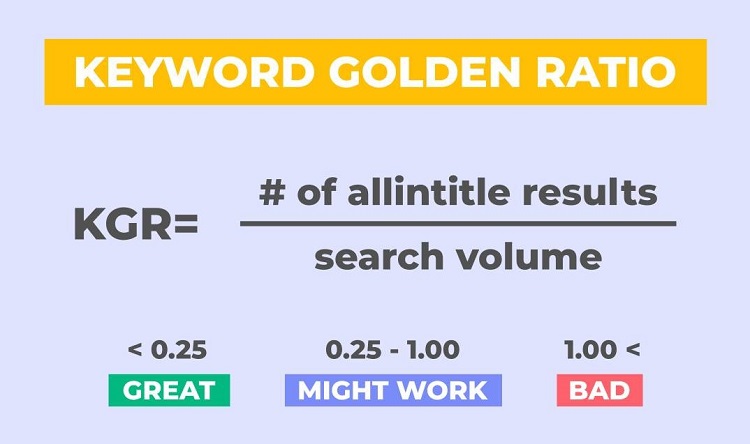
If you need to know something, it's hard to find someone who doesn't use Google. Google gets its information (search results) from some website.
It is now very hard and takes a lot of time to get a website on the first page of Google's search results. But if you do keyword research in a creative way, you could be on the first page of Google in just seven days (that is, as soon as Google indexes). Crawling is what Google does when it puts the results of a new website on its servers. After being crawled, the Google Index is put into different groups for ranking.
The Keyword Golden Ratio is a data-driven method that will help you find the low-hanging fruit among the keywords and get ahead of your competitors.
The Keyword Golden Ratio (KGR) is a way to find keywords that are underserved on the internet based on data. If you find a Keyword Golden Ratio phrase and use it as the focus of a piece of content, your article should rank in the top 50 in a few days or even hours. You can rank in the top 15 if your site has a good authority and isn't brand new.
The KGR is helpful for three main reasons.
you have data that other people can’t just pull up on a tool in a couple of minutes.
The Keyword Golden Ratio is this:
The number of Google results that have the keyword phrase in the title divided by the monthly search volume, where the monthly search volume is less than 250.
It is best to use the formula and look for KGR values under 0.25 at first. It has been tried and tested by a lot of people. In the future, you can play around with the numbers.
Based on my field research and what other people have told me, Google can rank pages faster for terms that aren't searched for as often. So, if everything else is the same, a keyword that gets 250 searches per month will rank higher than one that gets 2500 searches per month.
Most people go for keywords that get a lot of searches because they can make more money that way. So, more people are playing for the same short-tail keywords.
Under 0.25 is where the KGR works best. When you multiply the formula, it's easy to see why it's so easy to get into the top 50.
You get about 63 allintitle results if your KGR is 0.25 and your maximum search volume is 250. That means that the keyword phrase is in the title of about 63 web pages that are trying to attract people who are looking for it.
Using the Keyword Golden Ratio in your keyword research and content strategy could pay off in a big way over time. But it's not a one-size-fits-all strategy that you can use on your site and expect to work right away.
Aside from the benefits we've already talked about, KGR also has some problems that could hurt your online business. So, before you use Keyword Golden Ratio, you should know its pros and cons. This will help you decide if this strategy is really right for you.
Pros
Cons
Keyword Golden Ratio won't put your site at the top of search results by magic. Still, KGR can help you get organic traffic to your website as soon as possible if that's what you want. If you follow the steps above, you should be able to find a few KGR keywords for your website, no matter what niche it is in. At the same time, you need to look at your business more closely and figure out how KGR fits into your goals and plans. The Keyword Golden Ratio might not be what your business needs, but that's fine. You need to make a decision as soon as possible so that you don't waste time trying out strategies that don't fit with your current plan.
In the end, KGR is just one of the many SEO strategies you need to think about. If you combine it with other methods, your site should grow faster and get more visitors and sales in a short amount of time.